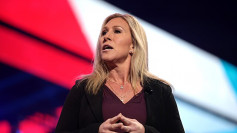In the dynamic arena of the 2024 Republican presidential race, Nikki Haley is currently experiencing a surge in media attention, donor interest, and discussions about her potential to challenge Donald Trump. Despite this growing interest, the reality presents a significant uphill battle for Haley, the 51-year-old former South Carolina governor and U.N. Ambassador, to secure the Republican nomination against the formidable presence of the 77-year-old former president.
Kyle Kondik, an elections analyst at the University of Virginia Center for Politics, notes the steep challenge ahead for Haley, observing that current polling data heavily favors Trump. National opinion polls consistently show Trump leading by a substantial margin, with Florida Governor Ron DeSantis also featuring prominently in the race. Trump's lead extends to key early nominating states like Iowa and New Hampshire, though Haley has recently made gains in some polls, drawing even with DeSantis in Iowa and surpassing him in New Hampshire.
Republican pollster Whit Ayres outlines a narrow path to victory for Haley, which involves strong performances in both Iowa and New Hampshire and possibly a win in her home state of South Carolina. Achieving top-tier finishes in these early states could provide Haley with the momentum, media coverage, and financial support from anti-Trump donors that are crucial for her campaign. Ayres highlights the importance of momentum in influencing subsequent larger states in the nomination process.
Despite her recent strides, winning South Carolina remains a daunting task, as Trump currently enjoys a substantial lead in the state. His advantage is similarly robust in Iowa and New Hampshire. Trump's support has solidified even in the face of legal challenges, with many voters initially hesitant to support him now rallying to his side.
For Haley to have a viable chance at the nomination, the field needs to narrow, ultimately leading to a direct contest between her and Trump. This scenario would allow Haley to unite anti-Trump factions within the party and potentially draw some of Trump's supporters. A memo released by Haley's campaign earlier in November, authored by campaign manager Betsy Ankney, pointed to Haley's growing strength in key states and the consolidation of the field.
Olivia Perez-Cubas, a spokesperson for Haley, emphasized the momentum Haley is gaining and the possibility of further consolidation in the coming weeks. However, should Haley's rise continue, she is likely to face intense scrutiny and attacks from the Trump campaign, pro-Trump social media influencers, and super PACs.
The contrasts between Trump and Haley are stark, with Trump's anti-immigration platform and populist approach resonating strongly with a large segment of the Republican base. Haley, in contrast, represents a more traditional Republican establishment figure, advocating for interventionist foreign policies and fiscal conservatism.
Despite the challenges, Haley's campaign continues to gather momentum, and her upcoming appearance in the fourth Republican debate in Tuscaloosa, Alabama, offers another opportunity to present her case to a national audience. Whether she can effectively consolidate anti-Trump support and appeal to Trump's base remains a critical factor in her campaign's trajectory.






